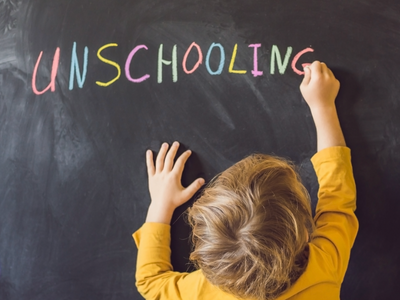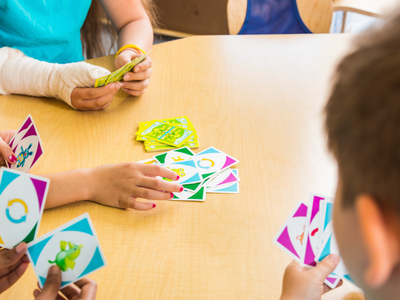Homeschool vs Unschool vs Gameschool


Education is increasingly becoming a lot more flexible, and there are now many different ways to teach children. In this article, we’ll discuss the similarities and differences between homeschooling, unschooling and gameschooling.
Though they can sometimes be referred to interchangeably, there are some aspects that set them apart and our aim is to offer you a clear and insightful overview on these three schooling methods, to best inform your learning/teaching journey. We hope that by providing you with some information on these methods, they’ll become a lot clearer in your mind!

Homeschool
What is homeschooling?
Homeschooling is the process of teaching and learning at home, as opposed to receiving education in the traditional classroom.
While homeschooling has always been around, it started becoming a more popular form of education in the 20th century, when parents voiced their concerns about the quality of teaching in schools at the time.
In the present day, homeschooling is extremely prevalent, as this teaching method is something that most parents and children had to experience in the past few years. Despite the reopening of most schools on an international level, a high percentage of families have now fully embraced homeschooling as standard practice, or have chosen to adopt homeschooling as part of a hybrid approach to education.
Where is homeschooling a popular form of education?
Homeschooling is the most popular in the United States, Canada, Australia, New Zealand and the United Kingdom.
On the other hand, some countries have completely banned this form of education, including countries in Africa, Asia, South America and Europe.
What are some of the most popular reasons for homeschooling?
There are multiple reasons for homeschooling, but here are the most popular:
- Parents’ dissatisfaction with the traditional schooling system / public school system.
- School schedule and/or distance
- Parents’ ideological beliefs and perspectives
- Children’s mental or physical wellbeing
- Lack of special needs support in the school system
What are some of the benefits of homeschooling?
Some benefits of homeschooling include:
- Flexibility and time freedom
- Personalised learning and opportunities for one to one teaching
- An opportunity to try different approaches to education, such as microlearning
- A bigger focus on children's mental and physical wellbeing
- An opportunity for parents and children to bond over educational topics
- A chance for children to learn at their own pace and take longer on topics they struggle with
- An opportunity to focus on hobbies and activities that are important to your child
What are some disadvantages of homeschooling?
As we know, all great things have their challenges, so when considering the idea of homeschooling your child, it’s important to take into consideration some aspects that can lead to negative outcomes. Some of these can be:
- Distractions. Our home has many distractions, as it’s the place where we store all the things we love. For children, it may be hard to distinguish between study and play spaces, especially if you don’t have a designated homeschool area.
- Parents may not be trained as teachers. While you may be really good at teaching your children, most parents are not qualified to teach academic curriculums, which may pose a great challenge!
- Isolation. Sometimes it’s easy to forget that children need a lot of interaction in order to naturally work on communication skills. They also need to socialize with other children, which may be difficult when homeschooling.
- Exhaustion. Homeschooling is extremely demanding, for children and more so for the parents, especially if you’re working and homeschooling simultaneously! It’s crucial to keep your homeschool plans fresh and fun, to ensure that you don’t burn out!
How do parents who homeschool structure their children’s education?
Homeschoolers often follow a curriculum, so the learning is structured around mandatory learning. Regarding homeschool schedules, it’s completely up to the family, as they have complete freedom over the number of hours and days per week they choose to homeschool, just as long as they meet the curriculum requirements. If you're thinking of giving homeschooling a try, make sure you devise a clear plan on how you'd like to organise your homeschool day in accordance with everything else you have going on!

Unschool
What is unschooling?
Unschooling is a method of learning that rejects traditional curriculum-based teaching and is instead very much child-led. While the term “unschooling” can sometimes be used by homeschoolers, the lack of curricula is what sets the two teaching approaches apart.
Unschoolers view education as a freeing activity, taking into account their children’s interests and turning those into learning experiences. Unschooling ideologies are often influenced by worldschooling practices, such as taking advantage of the world around them as inspiration for their studies. This teaching method is also linked to outdoor activities and learning from day-to-day life.
Where is unschooling a popular teaching method?
Similar to homeschooling, unschooling is particularly popular in the United States, United Kingdom, Canada, Australia and New Zealand, which interestingly are all English-speaking countries!
When looking at popular reasons as to why Western, English-speaking countries have the highest number of homeschooling/unschooling families, we found these to be the most common:
- Multilingual families/families who’ve immigrated to one of these countries may choose to homeschool/unschool in order to teach children more about their native culture, including a second language and other subjects that may be required in their home country but not where they currently reside.
- Distance from schools, particularly in Australia and New Zealand.
- Parents not being satisfied with the quality of traditional education
- Issues around safety - bigger countries tend to, in theory, be at a higher risk of dangerous incidents.
What are some of the most popular reasons for unschooling?
While the process of unschooling is very personal and differs from family to family, some of the most common reasons for unschooling are:
- The ability to teach children practical skills that aren’t taught in school but are needed in everyday life. This can include cooking, cleaning, effective communication, …
- The opportunity to nurture and build on academic skills naturally and patiently. Children are “sponges” - they absorb information a lot quicker than adults, and it’s very natural for children to want to read, draw, count, …
- Taking time to process information and work on more intricate skills at a different, more relaxed pace.
What are some of the benefits of unschooling?
All teaching methods come with their benefits! Here are some advantages of unschooling:
- It encourages independence.
- Unschooling usually adopts a very relaxed approach to learning, which may improve healthy communication and emotional understanding.
- Flexibility. Parents are able to set their own schedule, while children are allowed to choose what they learn about.
- Unschooling can reduce the pressure a child may feel in a traditional classroom setting, especially if they’re not academically strong.
- It provides an opportunity for the whole family to bond over learning experiences.
What are some of the disadvantages of unschooling?
Much like homeschooling, some disadvantages of unschooling can include:
- Lack of foundational knowledge that is needed in everyday life, such as factual information, basic written language skills, … (these are generalized and may not be the case for every family).
- Lack of a set routine.
- Socialization issues in the future.
- Inability to “switch off”.
How do parents who unschool structure their children’s education?
Parents and educators who unschool take every opportunity to teach their children valuable lessons. This often means that every situation or family outing can be classified as an educational practice.
For example, unschoolers may take a trip to a museum, or visit a historical monument and pay attention to their children’s reactions and opinions. If they seem interested in a particular topic, they may incorporate it into their schooling.

Gameschool
What is gameschooling?
Gameschooling is a fun and interactive teaching method that uses games as its main form of education. These games can be traditional, such as board or card games, or modern, much like video games.
Prioritizing gamified learning means that parents who gameschool understand the importance of children’s intellectual engagement and how they can achieve maximum focus while providing their children with a fun new way to learn!
What are some of the most popular reasons for gameschooling?
As we all know, we live in the age of technology, and children are no strangers to it! Here are some reasons why parents choose to gameschool:
- Children (usually) love games, so there is nothing more engaging than giving them exactly what they want!
- There is a huge variety of educational games out there, making it easier than ever to target specific topics at different skill levels.
- Games are a lot more interactive than a simple pen and paper.
What are some of the benefits of gameschooling?
These are some of the best benefits of gameschooling your child:
- Games are highly engaging.
- This method often “hides” the less exciting aspects of learning.
- Playing games is a lot less demanding and a lot more interactive than working through a worksheet.
- Competition is very motivating!
- As there’s often a clear goal to achieve, it’s been proven that educational games actually increase focus and improve academic performance.
- Games become more difficult as the player works through the different levels, which is great for steady progression!
- Gameschooling allows for great flexibility.
- Games are usually easily accessible and can be more inclusive than traditional teaching methods.
- Learning through games can be considered a form of microlearning, which is becoming an increasingly popular method of teaching.
What are some of the disadvantages of gameschooling?
Here are some gameschooling cons:
- Possible costs. Some games and interactive platforms might be more expensive compared to resources utilized in traditional learning methods.
- Lack of in-person socialization.
How do parents who gameschool structure their children’s education?
Gameschooling is very flexible and can be used alongside other teaching methods. For example, if you’re looking to homeschool, then there are curriculum-based games that you can use to work on academic skills. If you’re an unschooler, you can also take advantage of some gameschooling aspects to improve your child’s overall learning experience.
Final thoughts
While all three schooling methods can be interchangeable in some ways, there are special things that set them apart and make each of them unique and definitely worth a try. Now that we’ve taken you through the benefits and potential disadvantages of homeschooling, unschooling and gameschooling, we hope that we’ve given you the information you need to decide the next steps in your family’s schooling journey!
Night Zookeeper is used by thousands of homeschoolers, unschoolers, and gameschoolers, as well as traditional schoolers, to develop their children's reading and writing skills in a fantastically fun way! When joining the Night Zoo, our program is an easy fit into a homeschool writing curriculum which will transform your children’s love for reading and writing no matter how you decide to teach your children.
Sign up today and get a FREE 7-day trial!
Enjoyed this article? Check out our blog page for more homeschooling tips, reading & writing advice and more! Follow us on social media for writing prompts, homeschooling advice, competitions and much more:
Further reading:
- GOV.UK. 2022. Educating your child at home.
- Homeschool.com. 2022. Getting Started | Homeschool.com.
- Lockett, E., 2019. Unschooling: The Philosophy, Pros, and Cons of Unschooling Your Child.
- Parents Editors, 2020. What Is Homeschooling? A Guide for Parents and Students.
- Priore, A., 2021. Why Gameschooling Needs to Be Part of Your Back to Homeschool Plan.
- Worthen, M., 2020. Nytimes.com Opinion | ‘When You Get Into Unschooling, It’s Almost Like a Religion’


Make Reading & Writing Fantastically Fun!
- Award-winning reading & writing program for kids
- Improves spelling, grammar, punctuation & vocabulary
- Over 1,000 different learning games and activities


The Best Homeschooling Tips for Parents


How to Homeschool and Work From Home


How To Organize Your Homeschool Day


